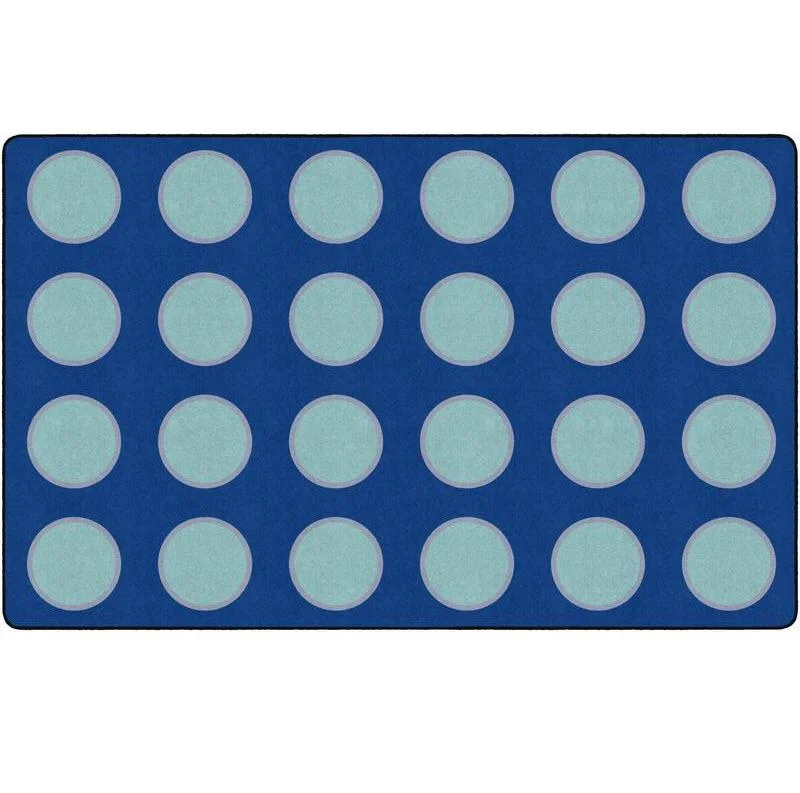The Blue Topaz Seating Rug is where the allure of precious gems meets the vibrancy of learning. Watch as your students immerse themselves in a world of vibrant colors, eagerly leaping out of their chairs to engage with the captivating design.
Please measure your area and choose the right size
Sizes:
- 6' x 8'4 Circles are 15" x 15" - 20 Seats
- 7'6 x 12' Circles are 17" x 17" - 24 Seats
Learning and play come to life on this premium carpet, providing an interactive and enjoyable experience for children.
Elevate your teaching space with the seamless blend of simplicity and wonder that this rug brings – making you the talk of the school!
Embrace the evolution of education with the Circles Blue Topaz Seating Rug, because even the best traditions deserve a modern twist.
Redefine your teaching style with this contemporary design, setting you apart as a trendsetting educator in the 21st century.
Learning and playing games on this high quality carpet is fun. Be the envy of other teachers with this simple yet wonderful design. Modern Design for Modern Teachers!
- Made in the U.S.A.
- Highest fiber density, with an infusion dye process that ensures bright color.
- Anti-Microbial and Anti-Static Treatment guards against odor, mildew and mold.
- Treated with Scotchgard protector for superior soil resistance.
- Class I Flammability Rating and Indoor Air Quality passed.
- Bound and double stitched with nylon edge yarn for maximum strength and durability.
Lesson Plan: Exploring Earth's Materials
Grade Level: Kindergarten - 3rd Grade
Subject: Science
Duration: 30-40 minutes
Objectives:
- Students will learn about the basic materials found on Earth: rocks, soil, sand, and water.
- Students will understand the importance of these materials in our daily lives.
- Students will participate in a hands-on activity to explore these materials.
Materials Needed:
- Small samples of rocks, soil, sand, and water (in clear containers or plastic bags).
- Magnifying glasses (optional).
- Earth Materials Observation Worksheet (a simple worksheet where students can record what they see and feel about the materials).
- The classroom seating rug with blue dots.
Introduction (5-7 minutes):
- Gather students on the seating rug—each student sits on a dot.
- Explain that they are going to learn about the things that make up our Earth: rocks, soil, sand, and water.
- Begin by asking them to share what they already know about these materials. Have them take turns speaking while remaining seated on their rug dots.
Activity 1: Explore the Materials (10-15 minutes):
- Show each material one by one (rocks, soil, sand, water) to the students. Pass the containers or bags around for the children to examine.
- As they explore each material, ask questions like:
- "What does it feel like?"
- "What do you think this is used for?"
- "Where do you see rocks/soil/sand/water outside?"
- After examining each material, have students use magnifying glasses (optional) to take a closer look.
- Worksheet Activity: On their Earth Materials Observation Worksheet, students can draw pictures of the materials and write or dictate what they observed.
Activity 2: Earth Materials Sorting Game (10 minutes):
- Using the blue dots on the seating rug, assign each row of dots to represent one of the four materials (rocks, soil, sand, water).
- Place labels or small visual aids representing the materials on the dots.
- Call out descriptions or show pictures of objects (e.g., a sandcastle, a garden, a river, a mountain), and ask students to move to the correct row that represents the main material used to create the object.
Conclusion (5 minutes):
- Gather the students back on their dots.
- Review what they’ve learned by asking:
- "What did we learn about rocks, soil, sand, and water?"
- "Which one was your favorite material and why?"
- End the lesson by emphasizing how important these materials are in helping plants grow, building homes, and creating landscapes like beaches and mountains.
Extension (Optional):
- If time allows, take the students outside to collect small samples of rocks, soil, or sand to explore more.
- Provide them with simple containers to collect and bring back materials to observe further in the classroom.
This lesson engages students in hands-on exploration while using the classroom seating rug for organization and movement. It’s a fun way for young learners to discover Earth’s natural resources!

